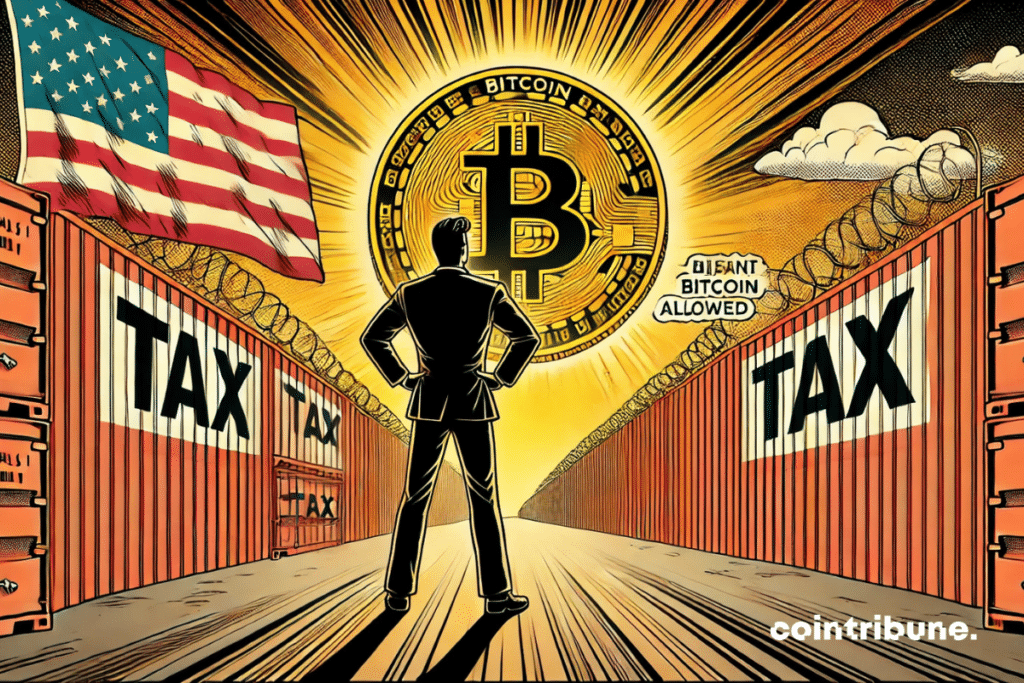Why Trump’s Tariffs Could Be Beneficial For Bitcoin?
1
0
As Donald Trump prepares to announce new tariff rights, investors are questioning the impact of these protectionist measures on cryptocurrencies. Contrary to initial fears, several financial analysts believe that these tariffs could ultimately strengthen Bitcoin’s position as an alternative safe haven.

Trump’s Tariff Policy and Its Immediate Effects on the Markets
On April 2, 2025, U.S. President Donald Trump is expected to announce the imposition of “reciprocal” tariffs targeting 15 countries, including China, Canada, and Mexico.
These protectionist measures initially caused a drop in Bitcoin prices, falling from over $100,000 at the beginning of the year to around $80,000 in March. This decline is explained by the growing correlation between cryptocurrencies and traditional assets, all affected by global economic uncertainty.
“It is the market’s appetite for risk that continues to deteriorate,” explains Marc Ostwald, Chief Economist at ADM Investor Services International.
For now, investors are favoring gold, which has risen by 18% since the beginning of the year, as a traditional safe haven.
However, as Zach Pandl, former macroeconomist at Goldman Sachs and current head of research at Grayscale, points out, “once this tariff announcement is made, crypto markets may potentially refocus on fundamentals, which are very positive.”
The Weakening of the Dollar: An Opportunity for Bitcoin
In the long term, tariffs could paradoxically enhance Bitcoin’s appeal by weakening the global dominance of the U.S. dollar. This fragmentation of the international financial system could thus create a favorable space for alternative currencies.
Omid Malekan, a professor at Columbia Business School, believes that Bitcoin could soon become “the new gold” in this context of economic uncertainty.
The rising prices linked to tariffs and potential retaliation measures from the U.S. trade partners are already pushing investors to seek decentralized assets.
Ryan Lee, Chief Analyst at Bitget Research, agrees:
The tariffs proposed by Trump could potentially multiply Bitcoin’s appeal by shaking trust in fiat currencies like the U.S. dollar, especially if inflationary pressures intensify. With a universal tariff of 20% threatening to provoke stagflation — rising costs without economic growth — combined with likely trade retaliation from global players, investors may increasingly turn to Bitcoin as a safe haven, exploiting its decentralized nature to protect themselves from the consequences of a global trade war.
Furthermore, tariffs could increase inflationary pressures, strengthening the argument for Bitcoin as protection against the devaluation of traditional currencies. According to experts at Wells Fargo and Bank of America cited by Ryan Lee, these protectionist measures could “increase manufacturing prices and erode dollar dominance,” thus directing more capital towards crypto markets.
Despite the current turbulence, Pandl remains optimistic:
I wouldn’t have left my job on Wall Street if I didn’t believe that Bitcoin would be the long-term winner.
In summary, Trump’s tariffs represent a paradox for Bitcoin: negative in the short term, but potentially beneficial in the long run. If global economic uncertainty persists, Bitcoin could confirm its role as a credible alternative to the traditional financial system, especially in a context where trust in the dollar is gradually eroding.
1
0
 Manage all your crypto, NFT and DeFi from one place
Manage all your crypto, NFT and DeFi from one placeSecurely connect the portfolio you’re using to start.





